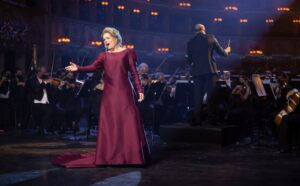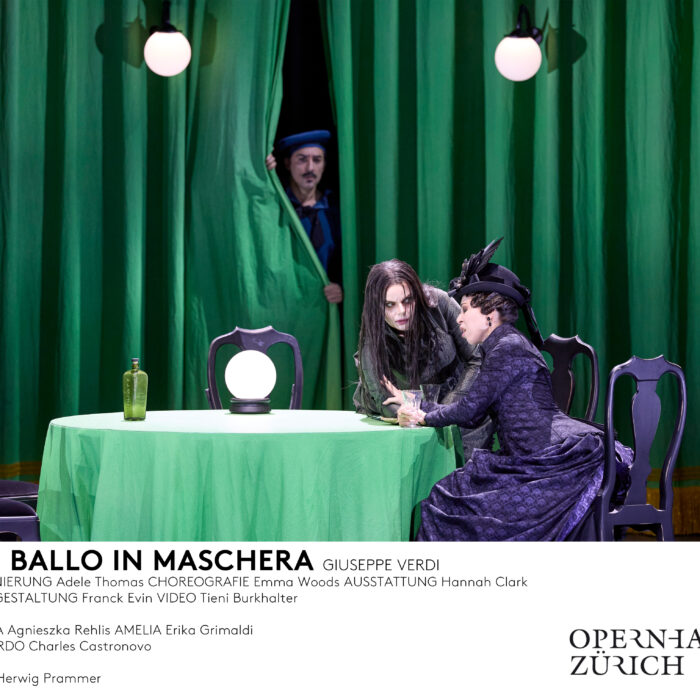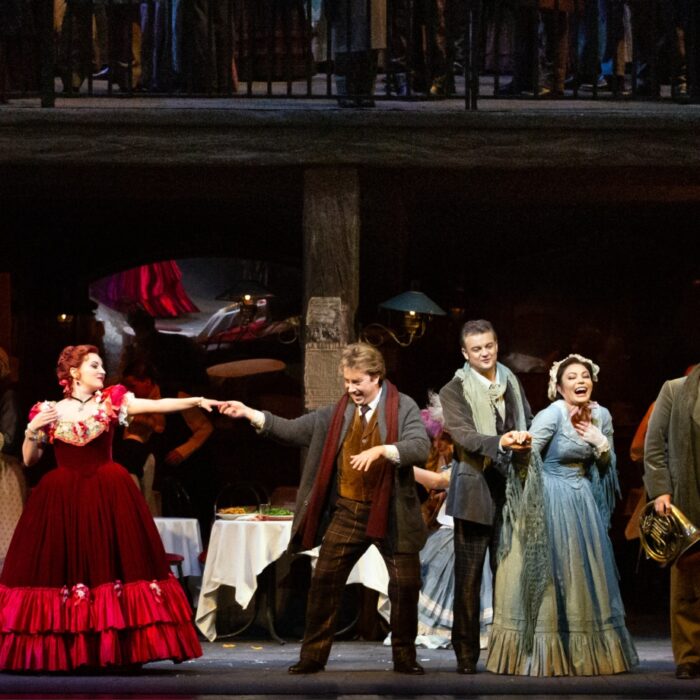
IMAX 2023 Review: Renée Fleming’s Cities That Sing – Venice
By Jennifer Pyron(Film still: provided by Unison Media & IMAX)
“Renée Fleming’s Cities That Sing: Venice (2023)” debuted in IMAX theaters on September 16, 2023. This very special feature-length film captures the most beautiful parts of Venice and explores opera’s nuanced details in vivid IMAX and Stage Access display. Fleming’s natural gift for storytelling and enriching the minds of audiences through her live performances, conversations with local artists, and historical key points is sure to make this series a timeless interest for both opera aficionados and beginners alike.
Renée Fleming’s Cultural Tour of Venice
Renée Fleming is on a roll. Her list of notable awards, leadership positions, and incredibly moving live performances make her a positive role model for many all over the world. When I was asked to attend and cover her latest film, “Renée Fleming’s Cities That Sing: Venice (2023),” I immediately went back into my catalog of memories pertaining to her. I began listening to Fleming’s voice when I was at conservatory and in my favorite place – the listening library. Renée Fleming was one of my go-to favorite voices, including Leontyne Price, Dame Kiri Te Kanawa, Joyce DiDonato and Anne Sofie von Otter. I vividly remember closing my eyes and visualizing Fleming’s vocal palette. Her range of colors and sensitivity to dynamics imprinted in me how important it is for one’s voice to be consistently unique in any given role. Fleming’s signature charisma and flare encouraged me to stay true to myself as a young singer and to honor the core of what it is that makes me a curious writer today – my own voice.
In this film, director François-René Martin and producers Tripp Hornick and Elmar Kruse resonate at this same level of awareness. “Renée Fleming’s Cities That Sing: Venice (2023)” takes audiences on a real-life journey through Venice and the legendary Teatro La Fenice. What began as a new recipe in her first IMAX and Stage Access film, “Cities that Sing: Paris (2022),” has developed into something more. I believe this is because Francois-René Martin, Hornick and Kruse honor Fleming as a performer and a human being who unequivocally inspires everyone around her. I say this because there is never a moment in the film that feels like she is acting or “putting on a show.” In fact, I felt included by Fleming in my learning process while listening to her speak about opera’s history in Venice and beyond.
The way the film begins with Italian conductor Riccardo Frizza and the Orchestra del Teatro La Fenice performing Rossini’s “Il Barbiere di Siviglia (Overture)” is an experience itself. There is a drone capturing aerial shots of Venice and then landing on a patch of water gently lapping the sides of Fleming’s boat. We see her being transported to La Fenice, gliding through scenic canals as a sweet breeze catches her and the camera’s lens softly expands beyond a bridge’s melting shadow. From this starting point and throughout the film, I felt like I was there. I did not want to blink in case I missed something. In my opinion, this level of attentiveness while watching a film is rare for most. Feeling bombarded with a surplus of easy watching on any streaming service is common. In the back of my mind, I dread how the art of experiencing film has radically changed. Therefore, what I think absolutely works best in this film series is the timing.
Francois-René Martin, Hornick, and Kruse have created a recipe for the film’s Midas touch by inviting audiences to partake in relaxed moments, such as boat rides and drone views of Venice, between the live performances. This gives the brain time to expand and breathe. These moments are like when the mouth savors a delicious Italian food or drink. I wanted to appreciate the film more because I felt I was only given the most beautiful parts to digest. And…Venice is gorgeous! I also found that Renée Fleming’s natural grace and gratefulness for this amount of beauty translates across the entire film from beginning to end. Every person she collaborates with and learns from along the way receives the same level of her endearing presence. Fleming is a naturally unlimited diva, and I think she makes this film feel accessible to every audience member alike. I kept thinking about how, if I were a child, I would want to watch this on repeat. I felt like I was making a whole new group of friends!
Performance Details & Highlights
Special guests include conductor Riccardo Frizza, born in Brescia, the Orchestra del Teatro La Fenice; mezzo-soprano Paola Gardina, born in Rovigo; tenor Francesco Meli, born in Genoa; baritone Mattia Olivieri, born in Sassuolo, La Fenice’s Artistic Director, Fortunato Ortombina and a local art historian that describes La Fenice’s acoustics in detail. He spoke about how everything on the walls of the theater must be hung by nails in order for the resonance to remain pure. Nothing can be glued. How beautiful, I thought, for every inch of detail to be so honest in its presentation, just like this film.
Fleming and Gardina perform the opening aria from Monteverdi’s “L’incoronazione di Poppea” – “Pur ti miro.” We see the singers facing backstage so that the conductor, orchestra, and theater are in full view together with them on camera. This was the setup for every performance that followed, and I loved how I could clearly see everyone interacting together on stage. The IMAX camera captures every detail of this intimate view. It was a historical making of an immersive and transportive collaboration.
Fleming’s voice was spectacular, and Gardina’s mezzo was the perfect match. I was afraid I might become overstimulated with everything that was happening at once, but again, I must iterate how the camera’s timing was spot on. Nothing felt rushed. Everything was made to be enjoyed.
For the next aria, Fleming performed Handel’s “Lascia ch’io pianga” from “Rinaldo.” There was a tenderness in her voice as she sang. I felt this was in part because it was her first solo moment in the space. She told us at the beginning of the film how she had only visited La Fenice as a tourist and not a performer. “Lascia ch’io pianga” sounded like a lullaby to the theater. Her voice dove into Handel’s luscious text as the theater’s soft lights sparkled on top of the orchestra’s playing musicians. This visually reminded me of the sun catching the tops of waves in the water, emanating an infinite field of floating diamonds. Fleming’s voice drifted me into the divine.
Next, conductor Riccardo Frizza and the Orchestra del Teatro La Fenice performed Rossini’s “Il Barbiere di Siviglia (Overture).” Paola Gardina followed up with a performance of “Una voce poco fa.” Her voice was radiant and full of life. I also enjoyed her minimal facial expressions and gestures as she sang from her heart. Baritone Mattia Oliveri performed “Largo al factotum” with gusto and charm. His glowing youthfulness was electric. I enjoyed the opportunity to experience Gardina and Oliveri close up as they each sang their solos. Obviously, their Italian diction was perfect, and it was fun to see them singing in their native language.
Verdi’s “La Traviata (Overture)” was performed next, and Fleming informed us about how the opera was initially not well received at La Fenice by audience members who blamed the lead soprano, Fanny Salvini-Donatelli, for not portraying Violetta favorably. After this debut, Verdi hired soprano Maria Spezia-Aldighieri to portray Violetta, which went over well with audiences. Despite its rough beginnings, Verdi’s “La Traviata” has remained one of opera’s favorites.
Verdi’s “Rigoletto” was introduced by tenor Francesco Meli as he performed “Questa o quella.” Meli’s voice was buoyant in the theater space. He developed his dynamics over time. Then, Fleming joined Meli, and together they performed Verdi’s “Parigi, o cara” from “La Traviata.” This was my second favorite moment in the film (Fleming’s “Lascia ch’io pianga” was my first). Both voices were brilliantly attuned to the sensitive acoustics of La Fenice as they melted into one another’s arms. The theater’s lights dimmed, and the lovers lulled listeners into pure bliss. I was very moved by their performance.
Verdi’s “Libiamo ne’lieti calici (Brindisi)” from “La Traviata” was the perfect follow-up choice. Conductor Riccardo Frizza and the Orchestra del Teatro La Fenice vivaciously brought this moment to life. All four singers joined in the fun of a “Brindisi” atmosphere.
Verdi’s “Già nella notte densa” from “Otello” was performed by Renée Fleming and Francesco Meli. This powerhouse duo once again showcased a superb performance. Puccini’s “O mimi tu piu torni” was an exciting choice for Francesco Meli and Mattia Oliveri. Both singers visibly charmed the IMAX cameras, and their voices blossomed into the theater, voicing about the confusing ways of love.
Renée Fleming performed Ruggero Leoncavallo’s “Musette svaria sulla bocca viva” with exquisite attention to detail. This was my third favorite moment of the film. I can’t wait to listen to this moment again. Her eyes sparkled along with the lights of the theater, and I could sense an overwhelming amount of love pouring through her.
Francesco Meli sang Puccini’s “E lucevan le stelle” from “Tosca” as his final solo. His performance was excellent and a great close to his successful showcase. Fleming also ended her solos for the evening with her well-known “O mio babbino caro.” I felt like history was being documented, especially during this aria.
Conductor Riccardo Frizza and the Orchestra del Teatro La Fenice performed Rossini’s “Il Barbiere di Siviglia (Overture)” and Pietro Mascagni’s “Cavalleria Rusticana (Intermezzo)” for the close of the film. This tied together a thoughtfully crafted list of performances for a most treasured way to experience the art and culture of Venice through “Renée Fleming’s Cities That Sing: Venice (2023).”



